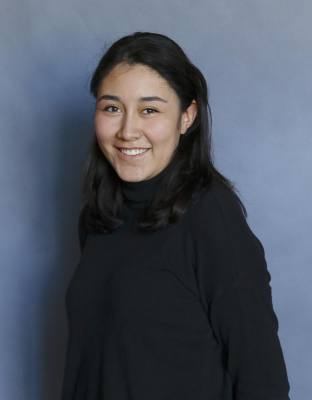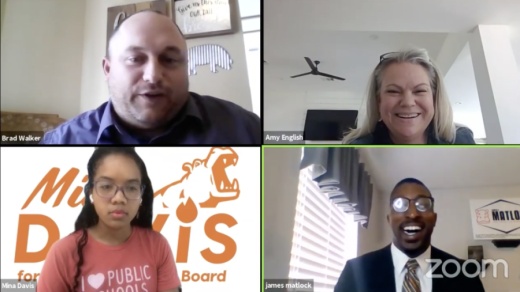Hutto ISD board of trustees candidates spoke on building relationships and community involvement during a virtual forum hosted by the Hutto Chamber of Commerce on April 13.
Trustees candidates are Mina Davis, Amy English and James Matlock. The three are running for two open seats on the HISD board. The forum was facilitated by Brad Walker, owner of Walker Insurance.
Early voting for the May 1 election starts April 19 and ends April 27. Here are some of the questions and answers from the forum.
How does your prior professional experience make you the best candidate for this position?
Mina Davis: I’m a data scientist, my experience is in forecasting. I do have the financial background as well. I have worked with state legislators in compiling documents and helping their advocates compile testimony when it comes to advocating for school budgets.
Amy English: I am a real estate broker and prior to being a broker, I was a realtor. Unfortunately, I’ve had to sit with families who had to sell their house because of the tax burden. That’s something that wasn’t a good experience. It was devastating for them; they basically couldn’t afford to live here in Hutto anymore. I’m hoping that my understanding of how the tax burden does affect families will be a benefit to the board as well as my understanding of real estate in the area and the developments coming.
James Matlock: My professional background has always been in finance, whether it’s been investments or looking at options, futures, equities. What that allows me to do is that I’ve been able to read through hundreds and hundreds of annual reports, looking at how those budgets are being spent, how the taxpayer dollars are being spent for the schools, for the cities and for those counties. I’m able to bring those questions into those board meetings to make sure that we are being fiscally responsible with the taxpayer dollars.
Is there a way to improve communication to better include the entire community for events happening in our district?
Davis: This comes down to my experience as an organizer. You really do have to do a lot of leg work to get people the information that they need. What I’ve done in the past as a community organizer, one way to be successful in this area is that you look at the stakeholders in each community. We just have to do a lot more in terms of physically getting ourselves out there, if you have the ability to, and also making sure that there’s different forms of communication.
English: I think that social media is relied on heavily but I think a lot of people aren’t on social media. We need to make sure that we are coming up with alternative solutions to let those people know, that aren’t on social media, the things that are happening in our schools. We want all our stakeholders to be involved in our schools.
Matlock: Technology is a great way, an easy way to get that information out to the public, but unfortunately a lot of our stakeholders are not on Facebook. Just really thinking outside the box. The majority of our neighborhoods in Hutto do have an HOA. That may be a consistent way to get information out because these presidents of HOA, they have the direct access to those individuals. How can we go from the school district directly to the HOA so that when they’re having those monthly or quarterly meetings, they are able to know what events the schools are having.
How will you foster positive, working relationships among the board, the superintendent and the executive team?
Davis: Being elected, granted while I may not have these existing relationships I will say that it is key that I was elected by my community members, of which these board members are such. At the end of the day, there are things and mechanisms in place that they are currently doing to make sure that we are cohesive. If I am elected, it’s just sitting down and talking to people.
English: I think that I am going, if I’m elected, that I will fall into that position very easily and the reason why is because, many of these people I’ve known for 15-20 years. I’ve worked alongside of them. I’ve worked in concession stands with them, I’ve worked on other boards with them, they’re people that I know very well. We aren’t always going to agree on everything, but I think that they know and I know that we all have the best interests of our children and our stakeholders in mind.
Matlock: Each and every group creates a synergy. In order to keep that synergy up, each and every person has their own positives that they add and their own negatives. The goal at that point is to figure out what are your strengths, what are your weaknesses, how can I use my strengths to help you with your weaknesses and vice versa. When it comes to the board acting as a unit, it’s all about creating that positive discourse, that positive information loop where we can sometimes have those really hard conversations together.





